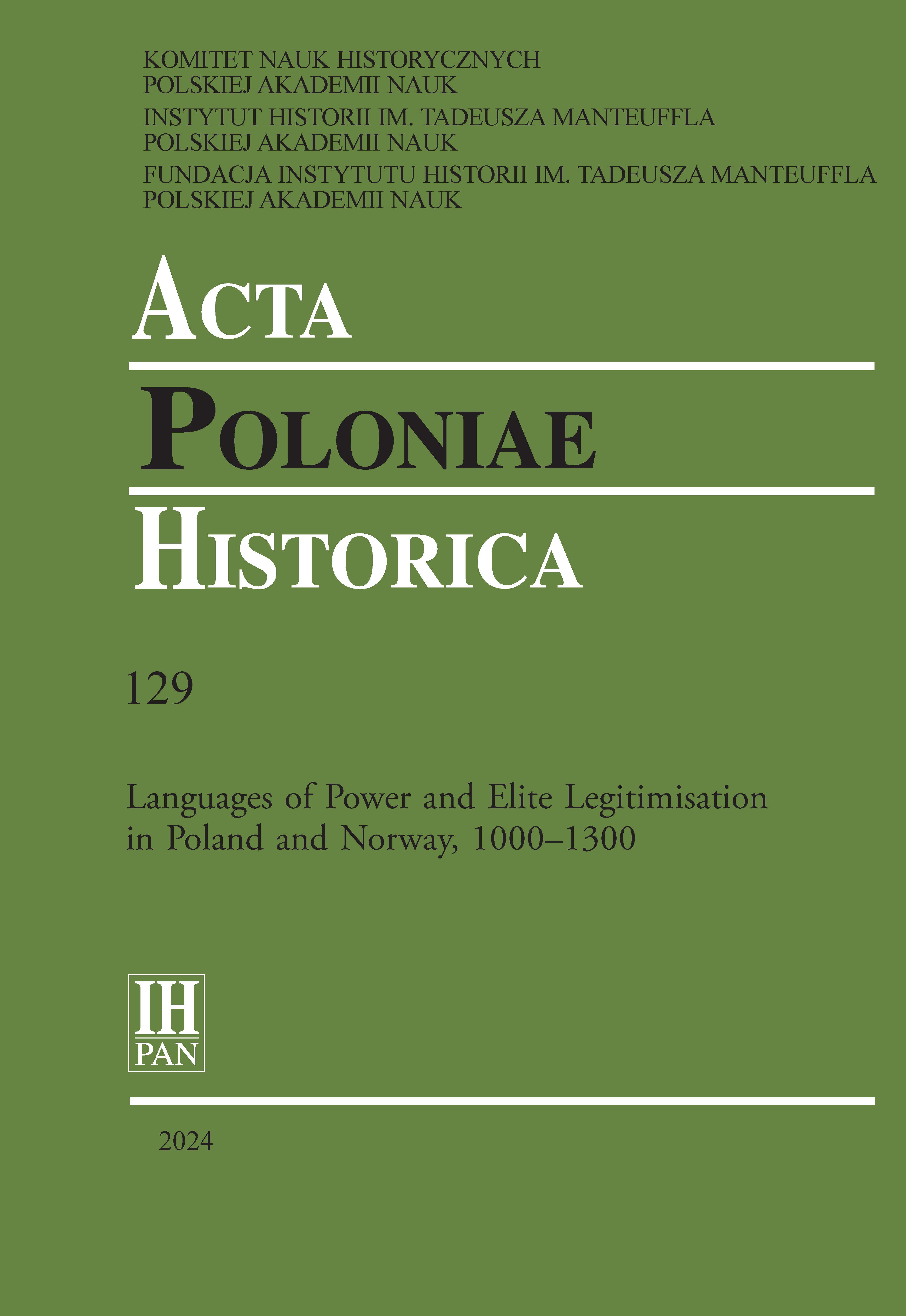Introduction: Languages of Power and Elite Legitimisation on the Periphery, Poland and Norway, 1000–1300
DOI:
https://doi.org/10.12775/APH.2024.129.01Keywords
legitimation, elites, symbolic capital, comparison, peripheries, centres, Poland, NorwayAbstract
In this introduction, we argue that the key to understanding the means and dynamics of political order in the peripheral polities during the era of Europeanization (1000–1300) lies in exploring the practices of (self-)legitimisation by the peripheral elites in Poland and Norway. The article proposes a novel agenda-setting theoretical and methodological framework for how medievalists can study elite legitimation and relations between core European and peripheral polities from a comparative perspective. This introduction launches this agenda in five steps. First, it outlines the key conceptual tools for studying the elites and the languages of power they used as means of symbolically legitimising themselves. Second, it re-assesses Robert J. Bartlett’s thesis of diffuse Europeanization to argue how a comparative focus on the peripheral elites and their languages of power can give a new perspective on this research topic. Third, it lays out the methodological tenets of an experimental comparative framework for elite legitimation on the peripheries. Fourth, it fleshes out these postulations in connection to our two contrasting cases and contexts, Polish and Norwegian. Finally, it presents the specific comparative case studies in this special issue.
References
Alfonso Isabel, Hugh Kennedy, and Julio Escalona (eds), Building Legitimacy: Political Discourses and Forms of Legitimacy in Medieval Societies (Leiden, 2004).
Bartlett Robert, The Making of Europe: Conquest, Colonization and Cultural Change, 950–1350 (Princeton, 1993).
Bougard François, Laurent Feller, and Régine Le Jan (eds), Les élites au haut moyen âge. Crises et renouvellements (Turnhout, 2006).
Bourdieu Pierre, Language & Symbolic Power, ed. by John B. Thompson, trans. Gino Raymond and Matthew Adamson (Cambridge, 1991).
Crumley Carole L., ‘Heterarchy and the Analysis of Complex Societies’, Archeological Papers of the American Anthropological Association, 6 (1995), 1–5.
Jezierski Wojtek, Kim Esmark, Hans Jacob Orning, and Jón Viðar Sigurðsson (eds), Nordic Elites in Transformation, c. 1050–1250, iii: Legitimacy and Glory (New York, 2021).
Kłoczowski Jerzy A., Młodsza Europa. Europa Środkowo-Wschodnia w kręgu cywilizacji chrześcijańskiej średniowiecza (Warszawa, 1998).
Lincoln Bruce, Apples and Oranges: Explorations In, On, and With Comparison (Chicago, 2018).
Melve Leidulf, ‘Komparativ historie: ei utfordring for historiefaget?’, Historisk tidsskrift (N), 88 (2009), 61–88.
Michałowski Roman and Grzegorz Pac (eds), Oryginalność czy wtórność? Studia poświęcone polskiej kulturze politycznej i religijnej (X–XIII wiek) (Warszawa, 2020).
Moretti Franco, The Bourgeois: Between History and Literature (London, 2013).
Orning Hans Jacob, ‘Norsk middelalder i et antropologisk perspektiv. Svar til Knut Helle’, Historisk tidsskrift (N), 89 (2010), 249–62.
Scales Len, ‘Ever Closer Union? Unification, Difference, and the “Making of Europe”, c. 950 – c. 1350’, English Historical Review, 137 (2022), 321–61.
Simmons Erica S., and Nicholas Rush Smith (eds), Rethinking Comparison: Innovative Methods for Qualitative Political Inquiry (Cambridge, 2021).
Vercamer Grischa, and Ewa Wółkiewicz (eds), Legitimation von Fürstendynastien in Polen und dem Reich: Identitätsbildung im Spiegel schriftlicher Quellen (12.–15. Jahrhundert) (Wiesbaden, 2016).
Downloads
Published
How to Cite
Issue
Section
License
Title, logo and layout of journal are reserved trademarks of APH.Stats
Number of views and downloads: 551
Number of citations: 2



